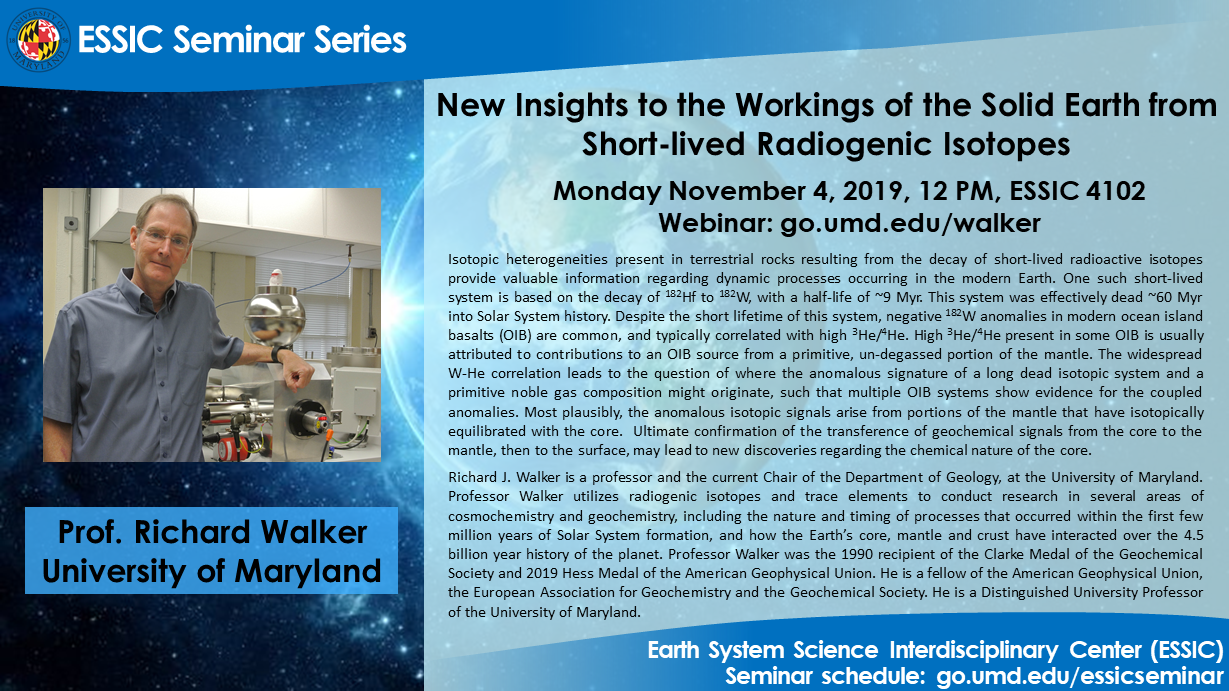New Insights to the Workings of the Solid Earth from Short-lived Radiogenic Isotopes
This event has passed. See the seminar recording here:

Prof. Richard Walker
University of Maryland
Monday November 4, 2019, 12 PM
ESSIC Conference Room 4102, 5825 University Research Ct, College Park, MD 20740
Abstract:
Isotopic heterogeneities present in terrestrial rocks resulting from the decay of short-lived radioactive isotopes provide valuable information regarding dynamic processes occurring in the modern Earth. One such short-lived system is based on the decay of 182Hf to 182W, with a half-life of ~9 Myr. This system was effectively dead ~60 Myr into Solar System history. Despite the short lifetime of this system, negative 182W anomalies in modern ocean island basalts (OIB) are common, and typically correlated with high 3He/4He. High 3He/4He present in some OIB is usually attributed to contributions to an OIB source from a primitive, un-degassed portion of the mantle. The widespread W-He correlation leads to the question of where the anomalous signature of a long dead isotopic system and a primitive noble gas composition might originate, such that multiple OIB systems show evidence for the coupled anomalies. Most plausibly, the anomalous isotopic signals arise from portions of the mantle that have isotopically equilibrated with the core. Ultimate confirmation of the transference of geochemical signals from the core to the mantle, then to the surface, may lead to new discoveries regarding the chemical nature of the core.
Bio-sketch:
Richard J. Walker is a professor and the current Chair of the Department of Geology, at the University of Maryland. He received a B.S. in geology from the College of William and Mary in Virginia. He earned both M.S. and Ph.D. degrees in geology from the State University of New York at Stony Brook. For his graduate research he studied lunar soils (M.S.), and ancient granites (Ph.D.). He did postdoctoral work at the U.S. National Bureau of Standards, the Carnegie Institution of Washington’s Department of Terrestrial Magnetism, and the U. S. Geological Survey. He joined the faculty of the University of Maryland in 1990. Professor Walker utilizes radiogenic isotopes and trace elements to conduct research in several areas of cosmochemistry and geochemistry, including the nature and timing of processes that occurred within the first few million years of Solar System formation, and how the Earth’s core, mantle and crust have interacted over the 4.5 billion year history of the planet.
Professor Walker was the 1990 recipient of the Clarke Medal of the Geochemical Society and 2019 Hess Medal of the American Geophysical Union. He is a fellow of the American Geophysical Union, the European Association for Geochemistry and the Geochemical Society. He is a Distinguished University Professor of the University of Maryland.
Webinar info:
Event site: http://go.umd.edu/walker
Event number: 735 013 523
Event password: essic
——————————————————-
To join the online event
——————————————————-
1. Click here to join the online event.
2. Click “Join Now”.
——————————————————-
To join the audio conference only
——————————————————-
US Toll: +1-415-655-0002
Global call-in numbers:
https://umd.webex.com/umd/globalcallin.php?MTID=e2f7599d41aa0db03a2e1c7f0792bd43f
Access code: 735 013 523
——————————————————-
For IT assistance
——————————————————-
Cazzy Medley: cazzy@umd.edu
Travis Swaim: tswaim1@umd.edu
Follow ESSIC:
ESSIC homepage: http://essic.umd.edu/
ESSIC seminar schedule/archive: https://go.umd.edu/essicseminar
ESSIC seminar site: https://go.umd.edu/essicseminarsite
ESSIC Youtube: https://www.youtube.com/user/ESSICUMD
ESSIC Twitter: https://twitter.com/ESSICUMD
ESSIC Facebook: https://facebook.com/ESSICUMDs
ESSIC seminar coordinator: Dr. John Yang, jxyang@umd.edu
Contact coordinator for subscribing email announcement or giving a talk

